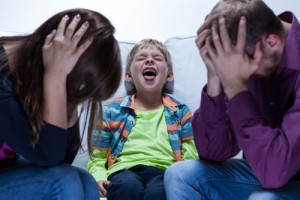
We woodland elves know that the life of a parent can be very stressful. With so much to do, so much to worry about, and so many people to care for, this life can take its toll on even our most resilient of woodland elves parents.
The biggest danger is that some parents can get so stressed out, they may end up emotionally neglecting their children. The child may have all their physical needs looked after (e.g. food, warmth, clothing, etc.) but the parent is unable to provide the emotional support that every child needs in their life.
These parents rarely intend to neglect their children and often will have experienced a similar lack of emotional support in their own childhood.
Emotional neglect can lead to many problems in a child’s future, including anxiety, stress, and depression, problems in school, and problems with friends.

Emotional neglect can lead to many problems for the child
The Solution
Positive musical interaction may lead to strengthened and enhanced parent-child interaction in general. Musical play may allow the parent to recreate elements of the early attachment process, interact with the child in a new and innovative way, and strengthen the parent-child relationship.
So far, most research has focused on the effect of music therapy on either the parent or the child. However, few studies have investigated the effect of music therapy on the observed interaction between the parent and child.

Make it a duet! It can enhance the parent-child interaction
The Question
Jacobsen, McKinney and Holck’s 2014 trial asked:
Can music therapy treatment with a parent and his/her emotionally neglected child improve parent-child interactions, diminish parent stress, and improve parent-child relationship?
We are particularly interested in this study as our team have just completed a systematic review of interventions for children to treat the consequences of abuse and neglect (Macdonald et al, in press).
Methods
Eighteen families, exhibiting signs of severe emotional neglect of a child between 5 and 12 years old, were recruited from a family care centre in Denmark. All 18 dyads (i.e. one child and one parent) received ‘treatment as usual’, which included conversations with psychologists about the parent’s wellbeing and their child’s development.
Families also received guidance on parenting practices. Half (9 dyads) were randomly assigned to also receive between 6 and 10 music therapy sessions with a credentialed music therapist, which took place once a week and lasted around 45–50 min.
Observational measures for (1) parent-child interaction, (2) parenting stress and (3) parent-child relationship were completed at baseline and 4 months post-baseline assessment.
Results
The following results we obtained four months after treatment.
Parent-Child Interaction
- Those receiving music therapy in additional to usual care increased Mutual Attunement, Nonverbal Communication and Parent-Child Interaction in Music over time, whereas treatment as usual group showed no change in these outcomes.
- Both groups experienced an improvement in emotional parental response scores over time.
Parenting Stress
- A total of 8 out of 9 families in the music therapy group experienced an improvement in stressful mood score change over time, whereas only 1 out of 9 families in the treatment as usual group experienced an improvement in stressful mood score over time.
- Both groups experienced a similar improvement in stressors related to the child’s characteristics, parents characteristics and total stress score over time.
Parent-Child Relationship
- The music therapy group improved (increased) their communication scores over time, whereas treatment as usual group showed no change over time.
- No significant interaction between groups for autonomy scores – indicating no effect of intervention on the child’s dependence on the parent.

8 out of 9 families in the music therapy group experienced an improvement in stressful mood score compared to 1 out of 9 families in the control group
Strengths and limitations
One of the major strengths of this study is that they used a Randomized Controlled Trial design – the ‘Gold Standard’ when it comes to testing whether an intervention works or not. However, they give very little information about how families were “randomly” assigned to groups , which makes it difficult to know for certain if it was truly random.
Likewise, they describe it as a “blind randomization procedure” yet, provide no information on who exactly was blinded. The outcome assessor was also a therapist so would know who they had treated and who they hadn’t, and participating families would obviously know if they got music therapy or not.
In terms of strengths the authors did run analyses at the start to check that the two groups had similar scores on all measures before the treatment. This makes it more likely that any differences we do see at the follow up assessment can be attributed to the intervention.
Authors’ conclusion
The study authors concluded that this study provided evidence that:
Music therapy had a significant effect on the parent´s ability to talk to the child including the parent’s level of empathy. Music therapy also significantly decreased how stressful parents perceived their children and in particular, how stressful the child’s mood was to the parent.
Our comments
Music therapy does seem to be in vogue at the moment but, having recently completed a systematic review of therapies for maltreated children ourselves (Macdonald et al, in press), we know that the evidence for its use in a maltreated population is scarce, so this study is a very welcome addition to the evidence base.
The results do appear promising with improvements in outcomes related to child neglect. However;
- This is quite a small study (n=18).
- The follow up time is short, at just four months.
- Authors did not measure subsequent reports of child neglect or other forms of abuse.
This is a potentially useful therapy for improving relationships in neglectful families but we would be much more interested to see this therapy tested in a larger RCT with longer follow-up or even better by pooling results of lots of trials, conducted in different places in a high quality systematic review and meta-analysis.
So if you are delivering this therapeutic approach, running and reporting on good quality randomised controlled trials would be incredibly useful for practitioners and families.

It’s a small yet important study & if you are delivering this therapeutic approach, help grow the evidence with more RCTs
Links
Primary link
Jacobsen SL, McKinney CH, Holck U (2014) Effects of a dyadic music therapy intervention on parent-child interaction, parent stress, and parent-child relationship in families with emotionally neglected children: a randomized controlled trial. J Music Ther 51(4): 310-332. [Abstract]
Other references
HTA – 11/110/01: The effectiveness, acceptability and cost-effectiveness of psychosocial interventions for maltreated children and adolescents: An evidence synthesis [Abstract]